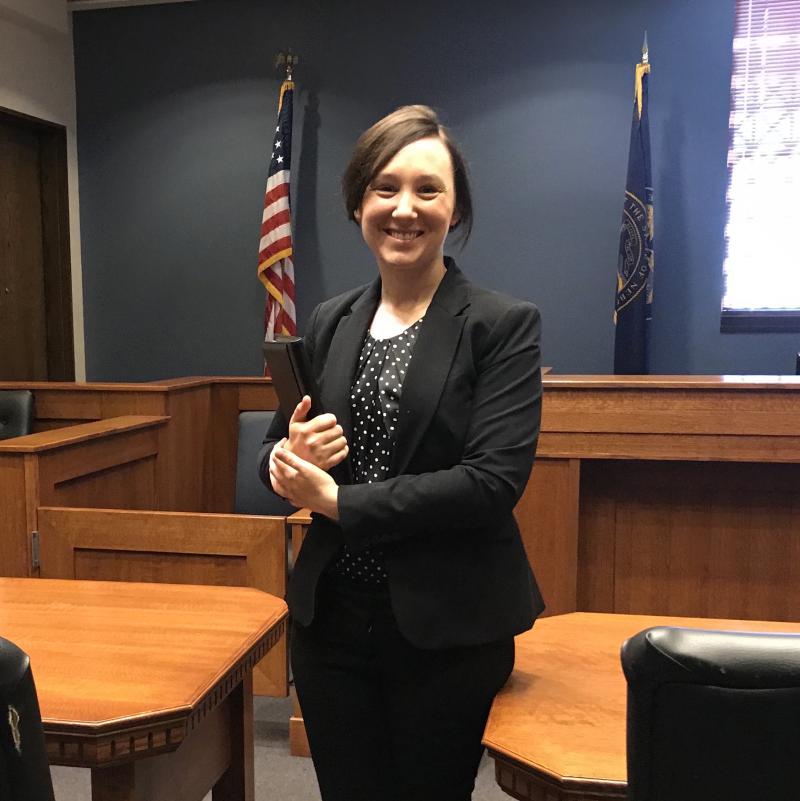
by Kimberly Barton
Project Harmony, a child welfare-focused nonprofit based in Omaha, started its Legal Summer Institute Program (LSI) in 2019. LSI places law students in 10-week summer internships with juvenile court judges, county attorney’s offices, private practitioners, nonprofits like Nebraska Appleseed, and community-based child advocacy groups. LSI interns participate in a weeklong training program focused on child advocacy before beginning their summer internships.
Last summer, 3L Kimberly Barton was one of seven Nebraska Law students to complete an internship through LSI. Below she provides an overview of her experience and reflects on the ways in which she benefitted from it.
Through Project Harmony’s Legal Summer Institute, I was placed with Joy Suder of Suder Law, PC LLO in Omaha. Ms. Suder is a solo practitioner with a focus on court-appointed juvenile defense and guardian ad litem work in Douglas County. My responsibilities included learning about Nebraska’s child welfare and juvenile justice system through observing juvenile court proceedings, assisting with Ms. Suder’s representations, researching law and policy, and drafting resource guides and memoranda.
I am most proud of developing a resource guide for LGBTQ+ youth in Nebraska’s child welfare and juvenile justice systems. The guide includes information such as sexual orientation and gender identity development, local LGBTQ+-affirming therapists, medical interventions and providers, youth and caregiver support networks, legal and social recognition options, relevant Department of Health and Human Services (DHHS) regulations, and relevant Prison Rape Elimination Act (PREA) policies for detention centers. I hope to formalize the guide and publish it in the future.
I also drafted a guide for juvenile transfer hearings between juvenile court and “adult court”. The guide includes a flow chart for understanding what kinds of cases are eligible for transfer, charts on the types and levels of crimes that affect transfers, an overview of the transfer procedures from “adult court” to juvenile court and from juvenile court to “adult court,” transfer decision criteria, recent Nebraska transfer case law, and sample questions for direct examinations of experts at a transfer hearing. Other projects I worked on this summer included drafting a guardian ad litem intake form that includes statutory references and checklists and researching several topics including: Raise the Age legislation, juvenile record sealing procedures, the harms of juvenile detention, and “No Reasonable Efforts” determinations.
In addition to assisting and observing Ms. Suder with her client casework throughout the summer, I had the opportunity to appear in juvenile court as a senior-certified law student on behalf of one of Ms. Suder’s clients. My biggest challenge at this hearing was learning about the many “players” in Nebraska’s juvenile courts. When a juvenile court judge calls a hearing to order, there can be upwards of ten people who are present as part of the case: parents, children, interested relatives, guardians ad litem, defense attorneys, county attorneys, Department of Health and Human Services representatives, caseworkers, probation officers, foster parents, support workers, and so on. It can be overwhelming if you are accustomed to the standard four: plaintiff, plaintiff’s lawyer, defendant, and defendant’s lawyer. Each professional in attendance has an individual role and responsibility as it relates to the child. Tracking them all while making sure you are doing your job to advocate for your client takes a lot of attention and preparation.
As a result of my participation in the Project Harmony Legal Summer Institute internship, I plan to practice juvenile law. In my final year of law school, I am participating in Nebraska Law’s Children’s Justice Clinic as a senior-certified guardian ad litem in Lancaster County’s juvenile court. Because of the foundation I developed through the LSI internship, I have been better able to serve my juvenile clients in the Clinic and use this experience to prepare for practicing full-time in juvenile court after graduation. This gives me more confidence when applying for postgraduate jobs with local law firms specializing in juvenile law or considering opening a solo practice.
Kimberly Barton is a third-year student at the University of Nebraska College of Law and will receive her J.D. in May 2020.